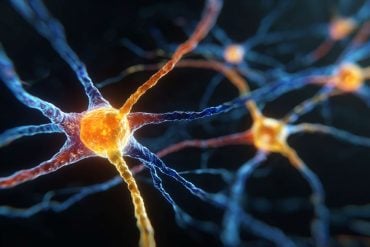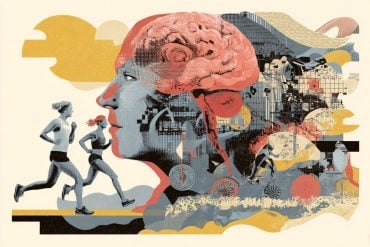Summary: Researchers report abstract reasoning in old age may be used to predict depressive symptoms over an extended period of time. The study found a correlation between a decline in abstract reasoning and a worsening of depressive symptoms in older people.
Source: APS.
Age-related declines in abstract reasoning ability predict increasing depressive symptoms in subsequent years, according to data from a longitudinal study of older adults in Scotland. The research is published in Psychological Science.
“Mental health in later life is a topic of increasing importance given aging populations worldwide,” says researcher Stephen Aichele of the University of Geneva. “Our findings suggest that monitoring for cognitive decrements in later adulthood may expedite efforts to reduce associated increases in depression risk.”
Many adults will experience some degree of cognitive decline in the latter decades of life. Research has also shown that cognitive impairments and depression are correlated in older adults – generally, as cognitive abilities decline, depressive symptoms increase. Yet, researchers have not been able to conclusively determine the direction of causation. That is, does cognitive decline lead to depression, does depression lead to cognitive decline, or do the phenomena mutually reinforce each other?
To achieve a clearer picture of the dynamics of this relationship over time, Aichele and colleagues examined data collected as part of the Lothian Birth Cohort 1936, a longitudinal study of adults in Scotland. Their analyses included data from 1,091 adults who were assessed at age 70 and up to three additional times in roughly 3-year intervals until age 79.
Although other work has examined depression risk in relation to memory deficits and other cognitive impairments associated with Alzheimer’s disease and dementia, the researchers chose to look at participants’ abstract reasoning, a cognitive ability that is closely related to functioning in daily life. Participants in the study completed several measures of abstract reasoning, performing tasks such as identifying missing elements from geometric patterns and reproducing visuospatial models using component parts.
The participants also provided information about their depressive symptoms via the Hospital Anxiety and Depression Scale.
On average, participants’ abstract reasoning ability and depressive symptoms worsened over the course of the study. Additionally, relatively lower cognitive function at each assessment was associated with subsequent increases in depressive symptoms, and this association became stronger over time.
Aichele and colleagues used advanced statistical models to analyze the dynamic relationship between these two measures over time. They found that lower abstract reasoning scores at one assessment were associated with increased depressive symptoms at later assessments; increased depressive symptoms at a given assessment were not linked with subsequent changes in abstract reasoning.
Sociodemographic and other health-related factors — such as education level, socioeconomic status, and diagnoses related to cardiovascular disease, stroke, and diabetes – did not appear to influence the relationship between abstract reasoning and depressive symptoms.

Understanding why age-related decrements in abstract reasoning lead to increased depressive symptoms remains a question for future research. Aichele and colleagues note that there are several potential mechanisms that could be at work, including unmeasured disease processes, genetic susceptibility, and declines in daily functioning.
The researchers hope to continue this work by examining factors such as training, treatment, and social support that might weaken the link between cognitive decline and depression.
“We hope this research will be of broad interest, both for individuals directly affected by age-related cognitive decline and also for family members and care providers who wish to help older persons adversely affected by changes in mental health,” Aichele says.
Funding: This work was supported by the Swiss National Centre of Competence in Research LIVES and financed by the Swiss National Science Foundation (Grant 51NF40-160590). Funding for Lothian Birth Cohort 1936 data collection was received from Age UK (Disconnected Mind project), the UK’s Medical Research Council (MR/M01311/1), and the Centre for Cognitive Ageing and Cognitive Epidemiology, which is supported by the Medical Research Council and the Biotechnology and Biological Sciences Research Council (MR/K026992/1).
Source: Anna Mikulak – APS
Publisher: Organized by NeuroscienceNews.com.
Image Source: NeuroscienceNews.com image is in the public domain.
Original Research: Open access research for “Fluid Intelligence Predicts Change in Depressive Symptoms in Later Life: The Lothian Birth Cohort 1936” by Stephen Aichele, Paolo Ghisletta, Janie Corley, Alison Pattie, Adele M. Taylor, John M. Starr and Ian J. Deary in Psychological Science. Published October 25 2018.
doi:10.1177/0956797618804501
[cbtabs][cbtab title=”MLA”]APS”Abstract Reasoning Ability in Older Adults Predicts Depressive Symptoms Over Time.” NeuroscienceNews. NeuroscienceNews, 14 November 2018.
<https://neurosciencenews.com/depression-aging-abstract-reasoning-10198/>.[/cbtab][cbtab title=”APA”]APS(2018, November 14). Abstract Reasoning Ability in Older Adults Predicts Depressive Symptoms Over Time. NeuroscienceNews. Retrieved November 14, 2018 from https://neurosciencenews.com/depression-aging-abstract-reasoning-10198/[/cbtab][cbtab title=”Chicago”]APS”Abstract Reasoning Ability in Older Adults Predicts Depressive Symptoms Over Time.” https://neurosciencenews.com/depression-aging-abstract-reasoning-10198/ (accessed November 14, 2018).[/cbtab][/cbtabs]
Abstract
Fluid Intelligence Predicts Change in Depressive Symptoms in Later Life: The Lothian Birth Cohort 1936
We examined reciprocal, time-ordered associations between age-related changes in fluid intelligence and depressive symptoms. Participants were 1,091 community-dwelling older adults from the Lothian Birth Cohort 1936 study who were assessed repeatedly at 3-year intervals between the ages of 70 and 79 years. On average, fluid intelligence and depressive symptoms worsened with age. There was also a dynamic-coupling effect, in which low fluid intelligence at a given age predicted increasing depressive symptoms across the following 3-year interval, whereas the converse did not hold. Model comparisons showed that this coupling parameter significantly improved overall fit and had a correspondingly moderately strong effect size, accounting on average for an accumulated 0.9 standard-deviation increase in depressive symptoms, following lower cognitive performance, across the observed age range. Adjustment for sociodemographic and health-related covariates did not significantly attenuate this association. This implies that monitoring for cognitive decrements in later life may expedite interventions to reduce related increases in depression risk.






